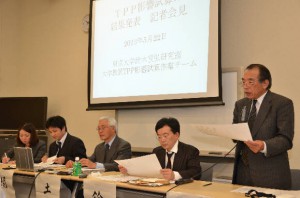A group of some 900 university professors and researchers announced on Wednesday, May 22, their own estimate of the possible economic impacts of joining the Trans-Pacific Partnership free-trade talks. They estimated that the production in the agricultural sector and related industries together could decline by 10.54 trillion yen, calculated on the assumption that tariffs on 33 agricultural items are immediately scrapped, the same simulation adopted by the Japanese government in estimating the impacts. They also said that 1.46 million workers in the agricultural sector, or 1.9 million including workers in related industries, would lose their jobs, and that the nation’s gross domestic product would decline by 4.8 trillion yen, or 1 percent.The government’s estimate announced in March is based on the Global Trade Analysis Project model, a well-known macroeconomic model incorporating trade policies of different nations. It said that output in the agricultural sector could decrease by 3 trillion yen, while the nation’s GDP would increase by 3.2 trillion yen or 0.66 percent, given the assumption that the government immediately abolishes tariffs between Japan and 11 TPP participants on 19 items in the agricultural sector and 14 items in the forestry and fisheries sector with tariff rates of 10% or more and production of 1 billion yen or more.

Professor Daigo from University of Tokyo (right) and his group announced their own estimate of the possible economic impacts of joining the TPP at Members’ office building of House of Councillors of Japan, on Wednesday, May 22.
Some experts have voiced doubts over the government’s estimate, however, saying that it is difficult to judge the actual effects on the people’s lives using this estimate, because it does not show the impacts on related industries and damages on employment, nor region-by-region estimates.
The professors unveiled their own estimate with the aim of providing the public with data to encourage debate on Japan’s participation in the TPP scheme. The group estimated the possible impacts on related industries, led by Eiji Doi, professor emeritus of statistics and market research at Shizuoka University, using the inter-industry relations table which shows how an output from one industrial sector may become an input to another industrial sector.
Assuming that production of 33 agricultural items decrease by 3 trillion yen as the government estimates, the group said that production in related industries, including commerce, manufacturing and transportation, is estimated to decrease by 7.7 trillion yen. They also said the decline in production of agricultural products would amount to 3.47 trillion yen, bigger than the government’s estimate, considering that consumption is expected to shrink along with the decrease in income in the agricultural and related sectors, which makes the total decline in production 10.54 trillion yen.
As a result, the group concluded that the nation’s GDP would drop by 4.8 trillion yen, and 1.46 million workers in the agricultural sector would lose their jobs. The number is equal to 58 percent of all the workers in the agricultural sector as of 2012. They also estimated that 440,000 jobs would be lost in related industries, totaling to 1.9 million job losses. This is equivalent to 68 percent of 2.8 million unemployed in March.
Meanwhile, Kohei Seki, associate professor of public finance at Shimane University, and Yu Miyoshi of J. F. Oberlin University calculated the possible decline in farmers’ income to estimate the actual impact on farmers. The estimate, based on 8 items – rice, wheat, barley, milk and other dairy products, beef, pork, chicken, egg – in which the income data is available through the farm management statistics of the agriculture ministry, shows that a drop in income nationwide would amount to 348.3 billion yen.
Nobuhiro Suzuki, professor of agricultural economics at Tokyo University, said he is re-estimating the economic impacts of the TPP talks using the government’s calculation method. Suzuki noted that the economic benefits of joining the TPP are smaller in terms of an increase in GDP than other trade agreements such as the Regional Comprehensive Economic Partnership talks. Suzuki is expected to report the details at a study meeting in Tokyo University on Sunday, June 16.
The professors made the estimate based on a fieldwork in Hokkaido and exchange of opinions with farmers. They plan to announce in the middle of June the estimates for each of the prefectures and possible effects on tax revenues.
Satoshi Daigo, professor emeritus of financial accounting at Tokyo University, who heads the group, stressed: “We made the estimate objectively by making use of each group member’s expertise, and we believe our estimate, which is made within a broad framework and with a viewpoint close to the people’s lives, can be used besides the government estimate for future debate.”
(May 23, 2013)

